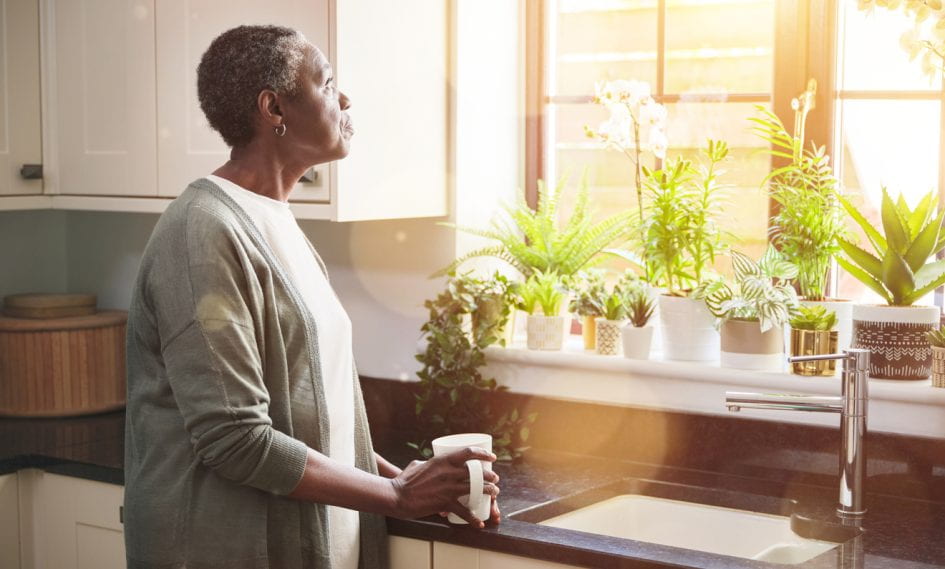Mary Frances De Rose was pursuing a career in architecture and health policy, with a focus possibly on the design of healthcare facilities, when a family member was diagnosed with dementia. Drawing on her knowledge of product design and interior design, De Rose began modifying her relative’s home to make it easier and safer to navigate.
Six weeks later, at a follow-up medical appointment, the doctors were surprised to note that the patient’s cognitive functioning had improved. They asked De Rose what had changed – maybe different foods? Taking vitamins? When she told them about the living space modifications she had made, the doctors were intrigued. They invited her to speak at a grand rounds session, the meetings where physicians discuss patients’ clinical cases, and was met with great interest.

“That was in 1989,” De Rose (left) remembers, “when doctors had nothing to offer families of Alzheimer’s patients to help improve their lives.” In the three decades since then, De Rose has designed homes for thousands of older adults, most of whom were living with dementia. Her work has helped to build the field of environmental gerontology, the study of older adults and how they relate to their socio-physical environments, usually with the aim of modifying and optimizing living spaces to improve the quality of life and longevity. She has worked at both the micro and macro level, from product and fashion design for older adults who may be arthritic or have dementia to the development of age-friendly communities where all ages can flourish.
Lately, De Rose has been focusing on the neuroscience of design. Working with the neuroscience and neurology department of a Washington, DC-area, hospital, she is using neuroimaging and generative design to guide the design of therapeutic or enabling living spaces.
“We’re looking at brain scans and imaging data from functional MRIs, trying to figure out what’s going on in a patient’s brain,” she says. Certain parts of the brain have to do with wayfinding, for example. “If the neurologist sees a deficit there, then I can go into that person’s living environment and make modifications, then see if that works for them.” Her work also emphasizes a strengths-based approach. “We look for neuro-indicators of patients’ abilities and create products and environments that will enhance their well-being.”
De Rose’s modifications follow a triage protocol: First she addresses safety issues such as camouflaging or disabling stoves if needed or protecting residents at risk of wandering. Next are functional needs—help with things such as wayfinding, maybe creating a path of lights at night to the bathroom, ways to help with getting dressed. Finally, she takes a therapeutic perspective, identifying the resident’s hobbies and interests and finding ways to help them still enjoy them – raised garden beds, for example, or easy access to their favorite music.
“We’re doing a lot of work with biophilic shapes, derived from nature, now,” she says, “And aromatherapy is a useful tool, scents can have calming effects. We’re doing a lot more sensory-based design.”
Nearly ten years ago, De Rose approached UMass Boston gerontology leaders about teaching a course on environmental gerontology. “UMass really took a chance on me,” she says. “I had funding to teach the class, and I wanted to see if we could grow the field.” Indeed, a handful of her students have joined the field over the years.
Her class is offered through the online Management of Aging Services master’s program. “The students are very engaged, they get inspired and submit such wonderful work,” De Rose says. Most of her students are mid-career and come from various backgrounds, from communications to policy to technology—all of which adds flavor and relevancy to the class discussions, she says.
“Mary Fran’s commitment to students and the field are inspirational,” says Ellen Birchander, MS, director of the MAS program. “She gives everything to ensure student success, going above and beyond to offer support in and out of the classroom. She is a strong advocate for older adults and an even stronger advocate for our students.”
The award-winning Management of Aging Services master’s program at UMass Boston, part of the second oldest graduate gerontology department in the world, is celebrating its 20th anniversary in 2023. The flexible, fully online program allows students to pursue a master’s degree at their own pace. Working professionals as well as newcomers to the fast-growing field of aging services will gain practical skills and relevant perspective from faculty with rich experience in the field.


August 21, 2023 at 1:04 am
Will want to Associate with Researchers on EG.. and study on therapy aspects
Well wishes for prospects
Prof Ajit Seshadri